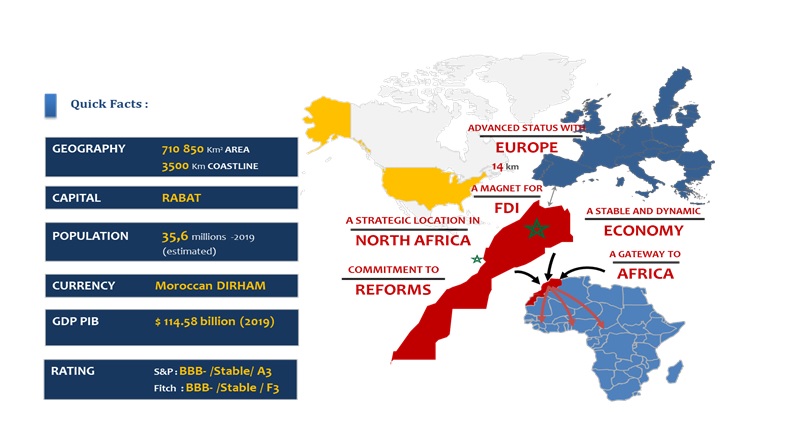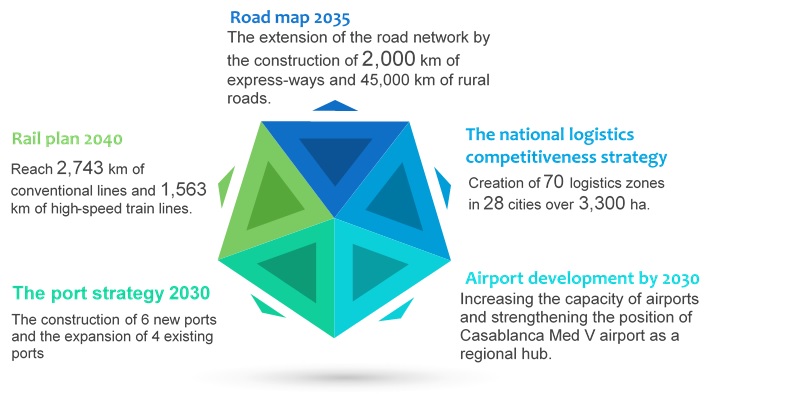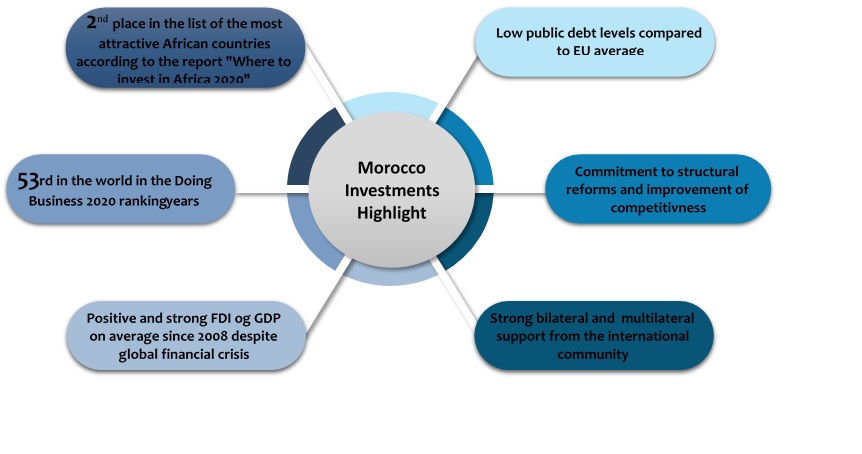Morocco at a glance

Location: The country in northwest of Africa is bordered by the Strait of Gibraltar and the Mediterranean Sea in north, by Mauritania in south, by Algeria in east and in west by the Atlantic Ocean.
Political Environment: In accordance with Article I of the 2011 Constitution, Morocco is a constitutional, democratic, parliamentary and social monarchy:
- The king is the Head of State of Morocco, the Supreme Representative of the nation, the symbol of its unity and the guarantor of the permanence and of the continuity of the State. His Majesty presents also the Supreme Arbiter between the Institutions and appoints the Head of Government from the political party with a majority of seats to act in the Chamber of Representatives.
- The parliament which is composed of two chambers (the Chamber of Representatives and the Chamber of Councillors) exercises the legislative power in the Kingdom, votes on laws, controls the activities of the Government and evaluates public policy.
- Executive power is exercised by the government
Economic Overview: The Moroccan economy is characterized by a great openness to the outside world. Since the early 80s, Morocco has adopted an economic and financial openness policy aiming at improving the liberalization of foreign trade, largest integration of the Moroccan economy into the international economy and at strengthening of contribution to the consolidation of a multilateral trading system. Most of the government’s strategies are laid out in the New Development Model released in April of 2021.
In this regard, significant advances in the modernization of economic and financial structures and upgrading of the legal and institutional frameworks have been accomplished. The aim is to permanently accelerate economic growth in Morocco and to improve living conditions of its citizens.
In this context, Morocco undertook the simplification of foreign trade procedures, the improvement of the business and investment environment, the expansion and the diversification of economic diversification of the productive base through integrated sectorial policies and finally, regular contributions to consolidate the multilateral trading system.
In addition, a set of legal texts were enacted or modified to support these reforms. These include, for example the Investment Charter, the Commercial Code, the law establishing the commercial courts, the Customs Code, the Law on free pricing and competition, the regulation of the State's markets, and the Law on the protection of industrial and commercial property.
An updated Investment Charter which came into force in May 2023, is expected to significantly expand incentives for foreign investment. The new charter aims to increase the private investment by two-thirds of total investment by 2035, includes additional incentives to draw investment to promising sectors and less favored regions, and provide additional support for the development of strategic industries such as defense and pharmaceuticals.
Moreover, the implementation of a new generation of sectoral strategies and plans based on the comparative advantages of the Moroccan economy (the “Generation Green” 2020-2030 strategy which aims to consolidate the achievements of the agricultural sector and strengthen its resilience in the face of climate change, the National Water Supply Program 2020-2027, the “Digital Morocco 2030” strategy, the tourism sector strategy for the 2023-2026 period, the phosphate and derivatives strategy and the energy transition strategy, in addition to the pursuit of the industrial acceleration policy, etc.) should foster sustained and sustainable growth in the years ahead. In addition, to reduce its energy dependency, Morocco has made significant progress in its renewable energy programs, raising the share of renewable energies to around 45% of installed electrical capacity, with a target of 52% by 2030.
In order to support these sectoral strategies and strengthen long-term growth, Morocco has initiated several strategies relating to infrastructure and logistics:

Finally, the process of economic openness and integration into the global economy is consolidated through the conclusion of free-trade treaties with the United States, the European Union, EFTA, Turkey, member States of the Arab League as part of the Greater Arab Free Trade Area, and the Mediterranean Arab countries as part of Agadir Agreement.
Furthermore, the EU has granted Morocco an "advanced status" which gives it the possibility to further integrate into the European Single Market and to participate to some inter-European cooperation programs reserved for members only, thanks to the privileged relations between Morocco and the EU, and given the progress realized in the political, economic and social fields, as well as the many reforms undertaken by the Kingdom.
Morocco continues to orient itself as the “gateway to Africa” and expanded on this role with the launch of the African Continental Free Trade Area (CFTA) in 2021. This new vision of openness has materialized through the conclusion, since the early 2000s, of more than 1.000 cooperation agreements with more than 40 countries and by the upward trend in the country's direct investments in sub-Saharan Africa, which have reached Dh 7,36 billion in 2021, placing our country as the 2nd African investor and the 1st investor in West Africa.
In this context, Morocco has the ambition to position itself as an essential export platform for investors wishing to target dynamic markets with high growth potential in Africa. As such, Casablanca Finance City (CFC) offers international investors a platform strongly connected with Africa and privileged access to investment opportunities through, among others, the Africa 50 Fund which aims to meet development needs infrastructure in Africa. In 2024, the Global Financial Centers Index named the CFC as the most attractive financial center on the African continent and fourth in the MENA region (behind Dubai, Abu Dhabi and Tel Aviv).

